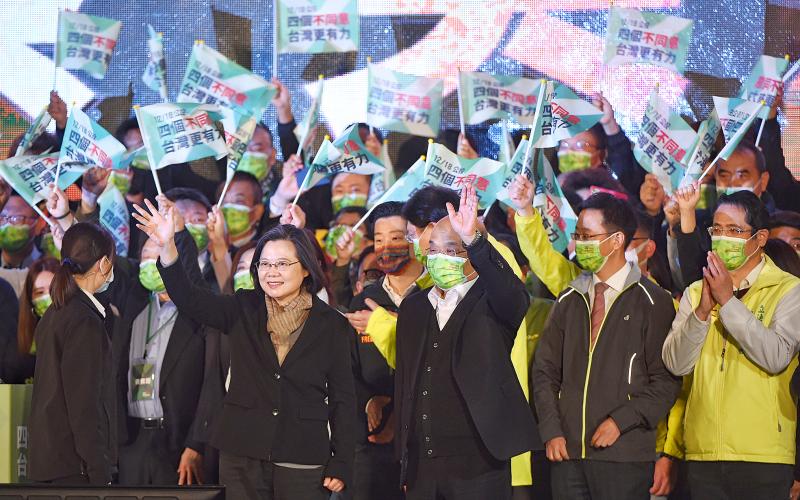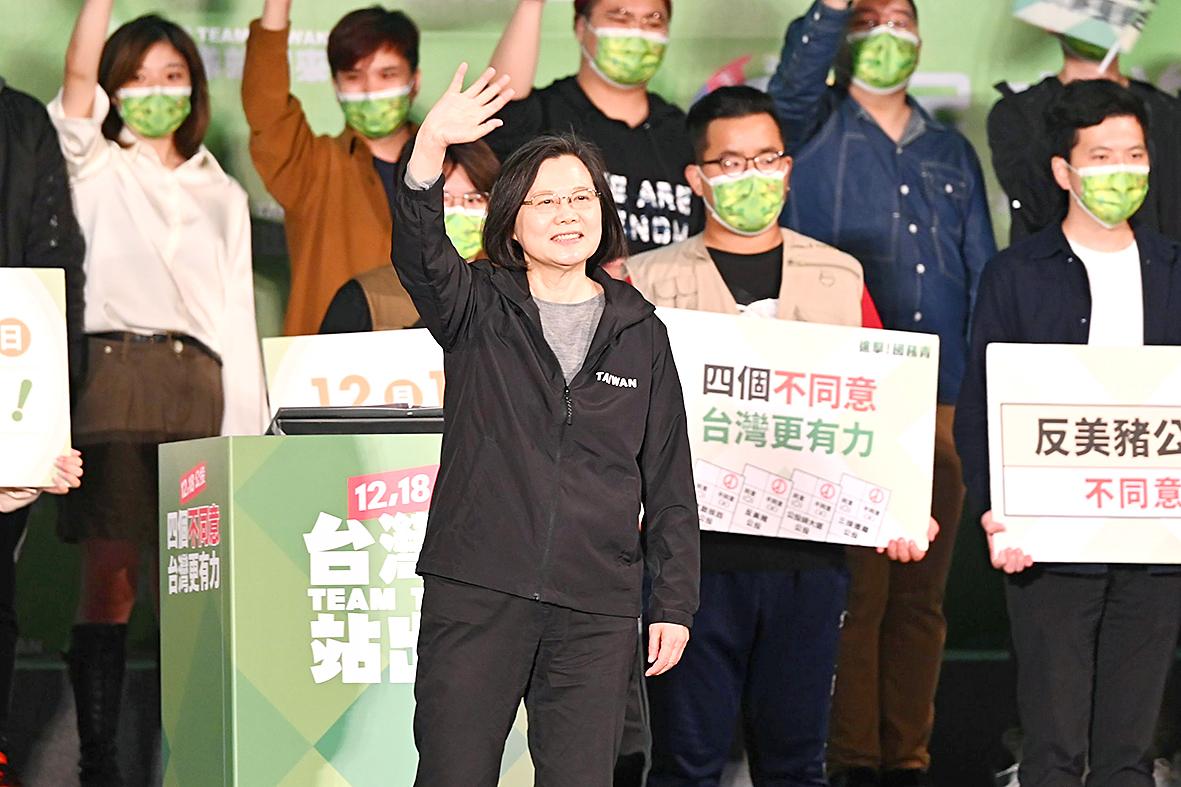It always nice to bask in the warm afterglow of another Chinese Nationalist Party (KMT) fubar, this time the defeat of all four of the referendums that it had promoted and the Democratic Progressive Party (DPP) had opposed.
The DPP displayed competence, changing strategies when it needed to and effectively motivating its somewhat younger base than the KMT, a base that is more likely to live far from where it has household registry than the older KMT base and thus, is more difficult to get out. Kudos to the DPP.
This was a performance that Taiwan needed: the ractopamine pork referendum might have caused unnecessary trouble with US, while re-opening the dilapidated and dangerous fourth nuclear plant was simply a bad idea. A defeat for the DPP might have invigorated the KMT as well; certainly it would have given that ally of Beijing an additional club with which to bash the pro-Taiwan side.

Photo: Liu Hsin-te, Taipei Times
Years ago, the midwife of Taiwan’s democracy, Lee Teng-hui (李登輝), remarked that if he was Moses leading Taiwan out of bondage, then Chen Shui-bian (陳水扁), who succeeded him as president, was Joshua, leading Taiwan into the promised land. Lee, who used to criss-cross the island giving sermons on humility and public service, understood his place in history. But if the story of Taiwan’s democratization contains a Joshua to Lee’s Moses, that figure is President Tsai Ing-wen (蔡英文), not Chen.
CULTIVATING RELATIONS
At home, Tsai has presided over a consolidation of the nation’s democracy with successful, clean, regular, even dull elections. Abroad, her calm demeanor and cultivation of good relations with the US and Japan and pursuit of relations with the world by other means has elevated Taiwan’s stance in the world, such as its city-to-city initiatives, highlighted last Wednesday in the Taipei Times (“Cities can expand Taiwan’s role,” Marcin Jerzewski and Huynh Tam Sang).

Photo: Lee Hui-chou, Taipei Times
As much as by what she has done, Tsai’s success has been defined by what she has not done, by things that didn’t happen. In February of 2008, as his presidency was in its final year, Chen flew out to Itu Aba Island (Taiping Island, 太平島), ostensibly for the opening ceremony of an airstrip there. It was a useless stunt that drew unnecessary attention to the island claims of the Republic of China (ROC). A piece in the international media called it a “stick-in-your-eye move by Chen” to the other South China Sea claimants, one that, even worse, aligned Taiwan with China.
Tsai has never engaged in stunts like that. Instead, she has made the ROC’s absurd and dangerous South China Sea claims largely disappear from public and international discourse. They have largely been a non-controversy.
Similarly, during the Ma Ying-jeou (馬英九) era, the Diaoyutai Islands (釣魚台) were a prominent irritant in relations between Taipei and Tokyo.
Aside from a couple of pro forma assertions of ROC sovereignty over the isles (most recently in June of last year), they too have gone into hibernation. Instead, on Friday the DPP and its counterpart ruling party in Japan, the Liberal Democratic Party (LDP), had another 2+2 meeting to discuss trade. The meeting was just another signal of the warm relations between the two states.
China’s aggression, expansionism, and arrogant blustering, of course, are partly responsible for Taiwan’s surging profile on the world stage. Yet, it is easy to imagine what stunts Chen might have pulled with a similarly fecund ground to till, how he might have chilled support and drawn attention to himself rather than Taiwan. Instead, Tsai’s low profile has enabled Taiwan to shine.
SUCCESSFUL TRANSITION
At home, Tsai and Taiwan’s democracy have both been helped by China’s threats toward the nation, which have helped build a Taiwanese identity and make it increasingly difficult for the KMT, allied to Beijing, to compete at the national level.
Yet, Tsai served as DPP chair during the bleak opening years of the Ma era, when the DPP had to rebuild after the Chen chased the golden calf and Frank Hsieh (謝長廷) lost in the 2008 election. That period was also vital for another reason — it saw the transition of the party from the period when it had been led by the older generation of dissidents and lawyers to its current generation of leaders.
Had the DPP fallen apart at that time, things might have gone ill for Taiwan and its democracy.
Instead, as scholar Austin Wang observed in “The Emergence of Tsai Ing-wen and the Presidentialization of DPP, 2008-2016,” Tsai beat back the party factions and their centrifugal tendencies that threatened to tear the party apart and centralized the DPP into a machine led by the president. Again, Tsai should be honored for what didn’t happen.
A less remarked on aspect of Tsai’s effect on Taiwan’s democracy: I know women who had voted blue their whole lives, who switched to voting for Tsai because she was a female (will they switch back in 2024?). When voters switch parties, it opens up new possibilities. Tsai’s light blue appeal is not limited to females: for a brief moment in 2008 she was mentioned as a possible running mate for Ma!
Remember too when DPP elder Koo Kwang-ming (辜寬敏) ran against Tsai for DPP chairperson in 2008, saying that unmarried women shouldn’t lead? Few publicly say that anymore. Tsai struck a blow against sexism in politics.
‘WE VOTE’
During the Ma years, the nation became ever more Taiwanese even as he tried to nudge it closer to China. Tsai was the DPP leader during that period and its presidential candidate during the 2012 campaign. Nicknamed “Little Ing” (小英) during that election, it would not have been difficult, with good marketing, for her to try to get herself identified with the party and the cause, personality-cult style. She avoided attempting that, which would have been very damaging for the party and for Taiwan’s democracy.
Last week I asked my students how they knew they were Taiwanese. One young woman promptly offered: “We vote.” Voting, like the round the island bicycle ride, has become more than just a way to select leaders, it is now a form of participation in the Taiwanese identity.
That is due, in part, to Tsai’s quiet, competent management of the way the DPP and Taiwan’s democracy have interacted for the last 13 years, avoiding all the things that might have happened, but didn’t.
Notes from Central Taiwan is a column written by long-term resident Michael Turton, who provides incisive commentary informed by three decades of living in and writing about his adoptive country. The views expressed here are his own.

The Taipei Times last week reported that the rising share of seniors in the population is reshaping the nation’s housing markets. According to data from the Ministry of the Interior, about 850,000 residences were occupied by elderly people in the first quarter, including 655,000 that housed only one resident. H&B Realty chief researcher Jessica Hsu (徐佳馨), quoted in the article, said that there is rising demand for elderly-friendly housing, including units with elevators, barrier-free layouts and proximity to healthcare services. Hsu and others cited in the article highlighted the changing family residential dynamics, as children no longer live with parents,

It is jarring how differently Taiwan’s politics is portrayed in the international press compared to the local Chinese-language press. Viewed from abroad, Taiwan is seen as a geopolitical hotspot, or “The Most Dangerous Place on Earth,” as the Economist once blazoned across their cover. Meanwhile, tasked with facing down those existential threats, Taiwan’s leaders are dying their hair pink. These include former president Tsai Ing-wen (蔡英文), Vice President Hsiao Bi-khim (蕭美琴) and Kaohsiung Mayor Chen Chi-mai (陳其邁), among others. They are demonstrating what big fans they are of South Korean K-pop sensations Blackpink ahead of their concerts this weekend in Kaohsiung.

Taiwan is one of the world’s greatest per-capita consumers of seafood. Whereas the average human is thought to eat around 20kg of seafood per year, each Taiwanese gets through 27kg to 35kg of ocean delicacies annually, depending on which source you find most credible. Given the ubiquity of dishes like oyster omelet (蚵仔煎) and milkfish soup (虱目魚湯), the higher estimate may well be correct. By global standards, let alone local consumption patterns, I’m not much of a seafood fan. It’s not just a matter of taste, although that’s part of it. What I’ve read about the environmental impact of the

Oct 20 to Oct 26 After a day of fighting, the Japanese Army’s Second Division was resting when a curious delegation of two Scotsmen and 19 Taiwanese approached their camp. It was Oct. 20, 1895, and the troops had reached Taiye Village (太爺庄) in today’s Hunei District (湖內), Kaohsiung, just 10km away from their final target of Tainan. Led by Presbyterian missionaries Thomas Barclay and Duncan Ferguson, the group informed the Japanese that resistance leader Liu Yung-fu (劉永福) had fled to China the previous night, leaving his Black Flag Army fighters behind and the city in chaos. On behalf of the